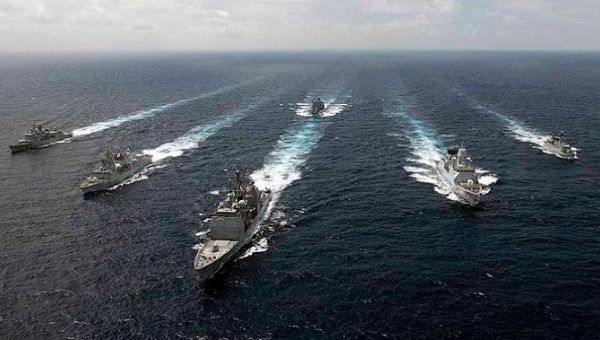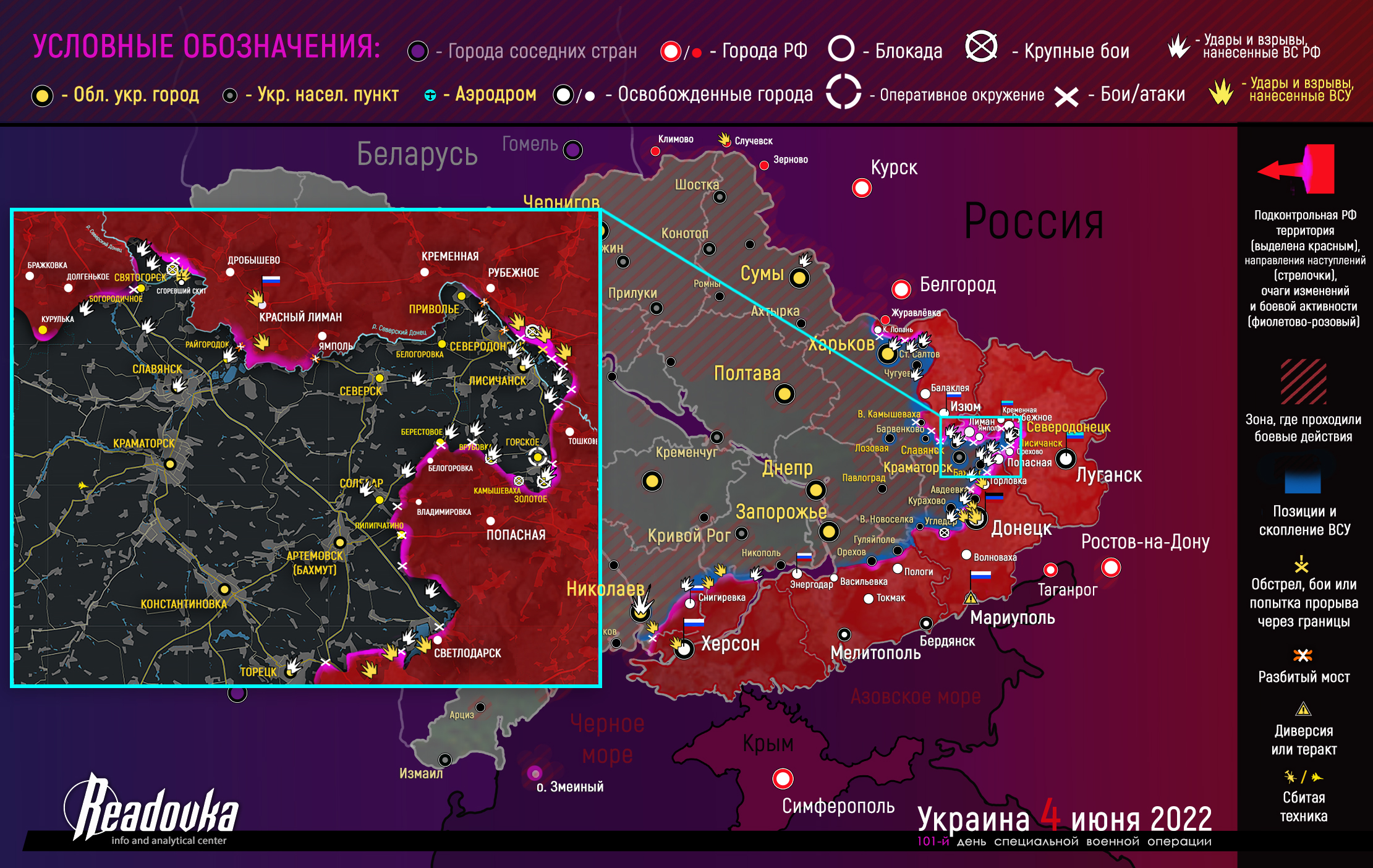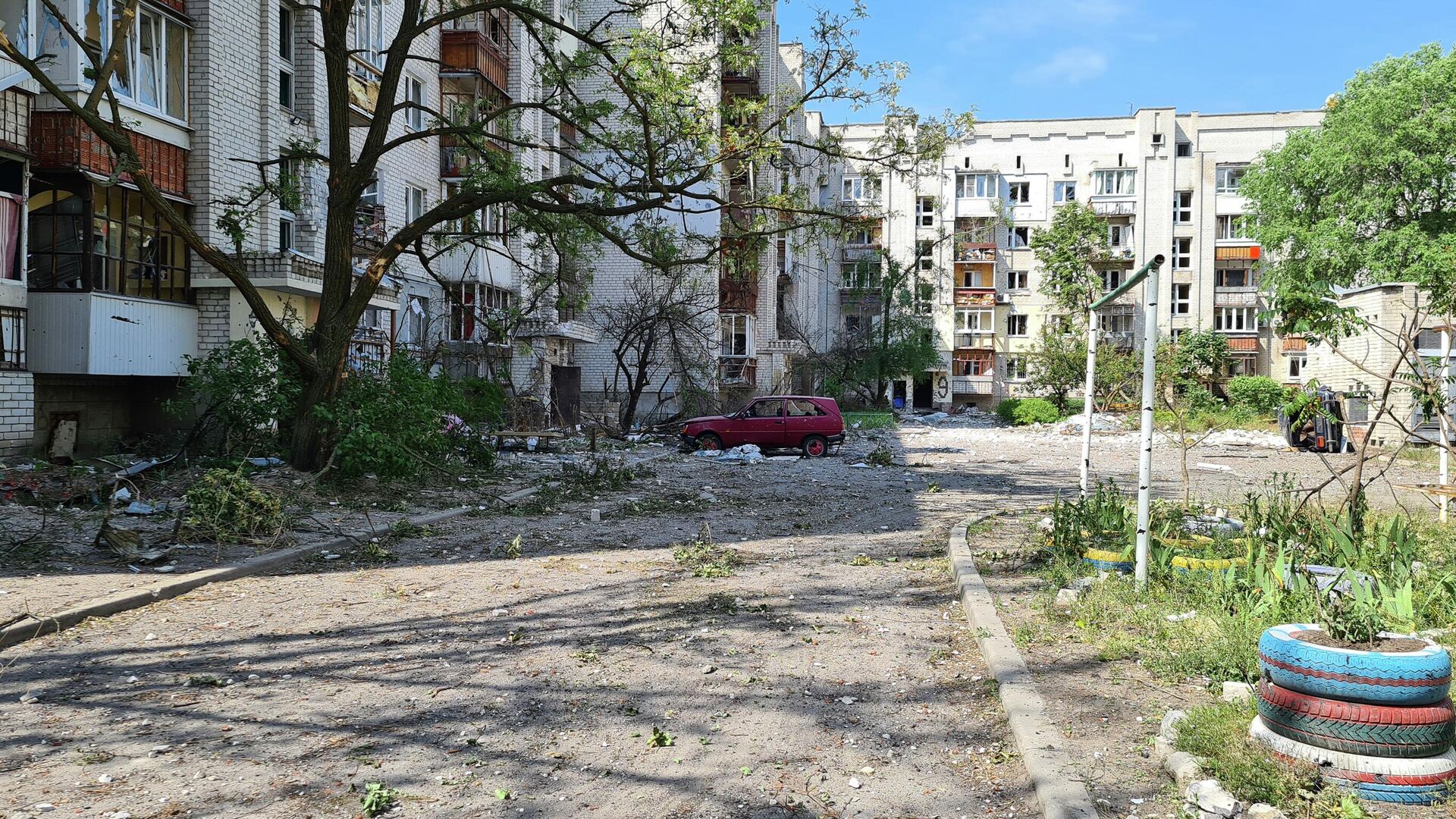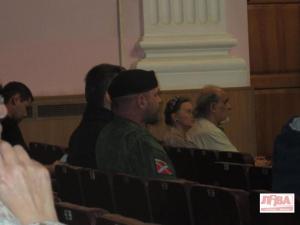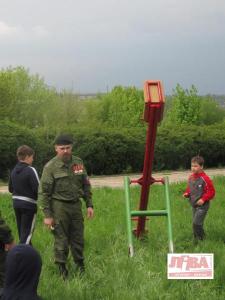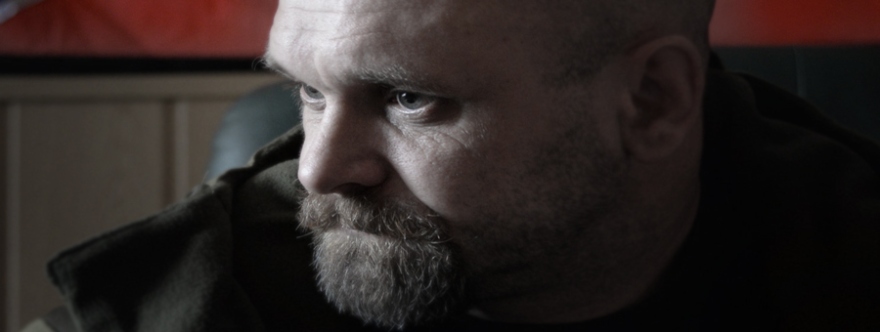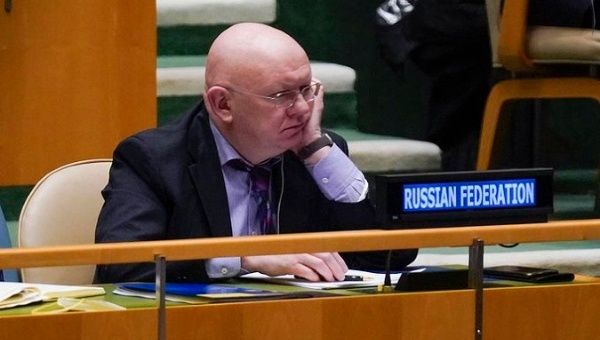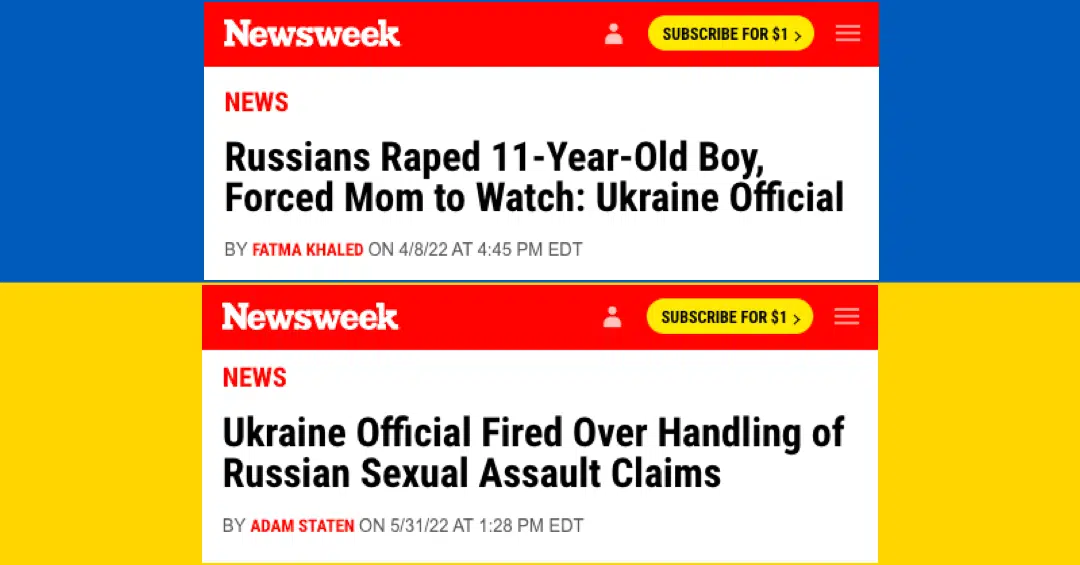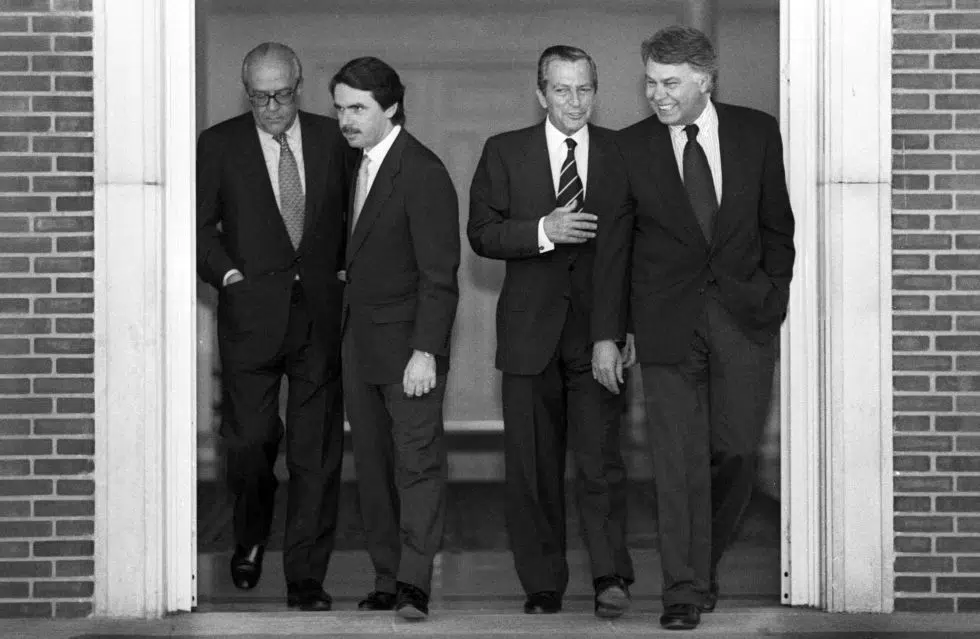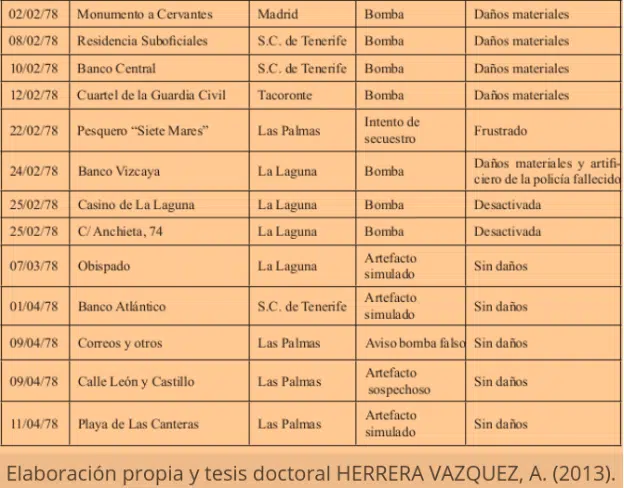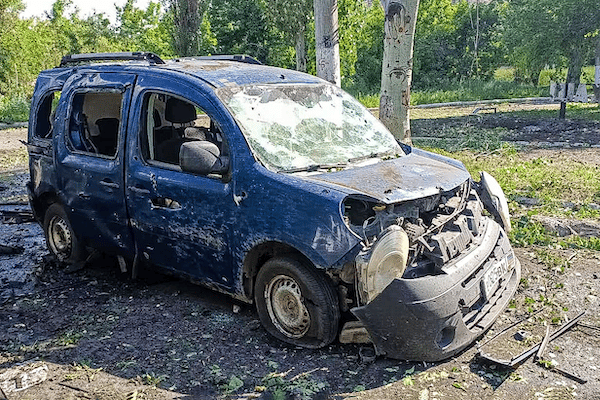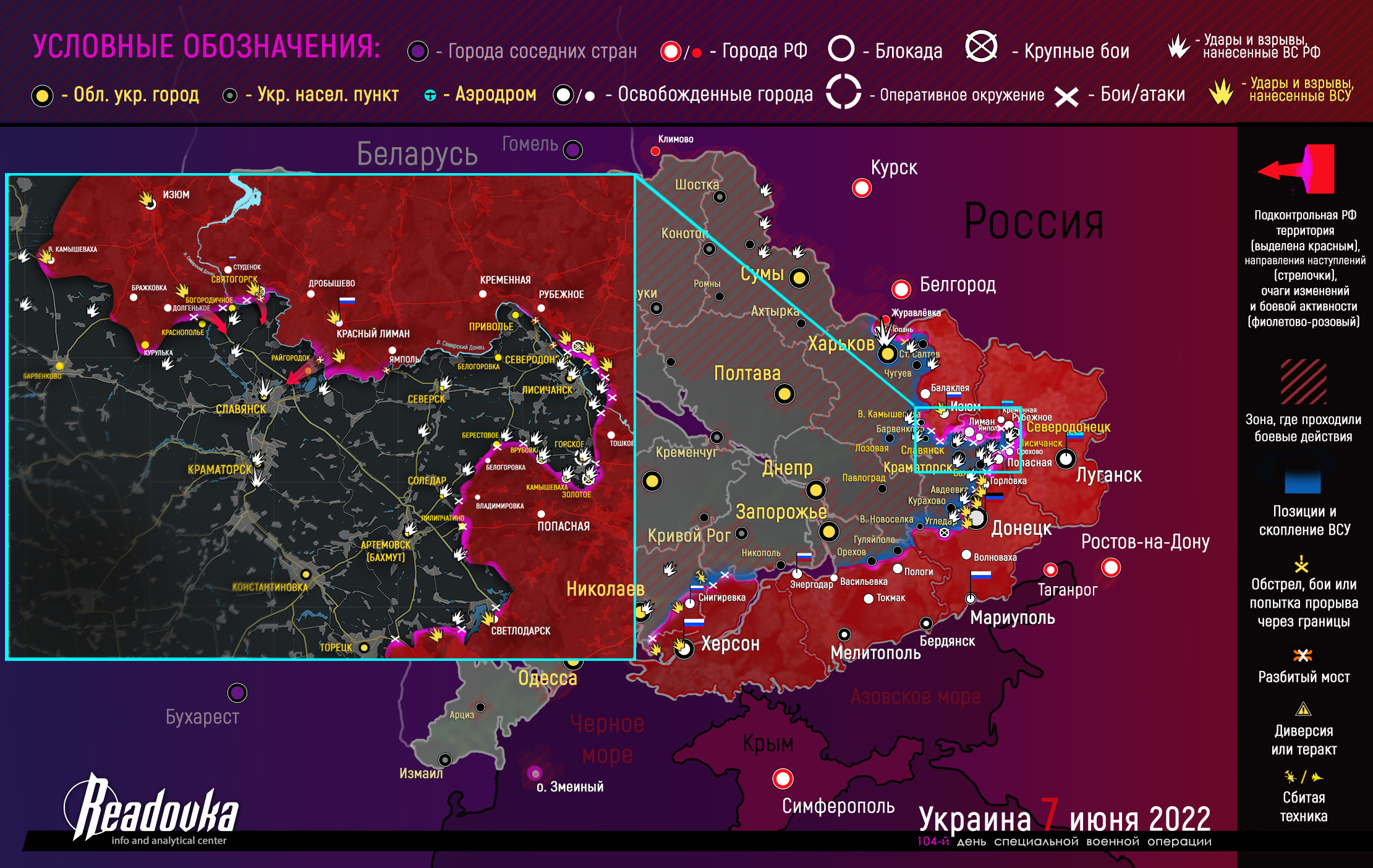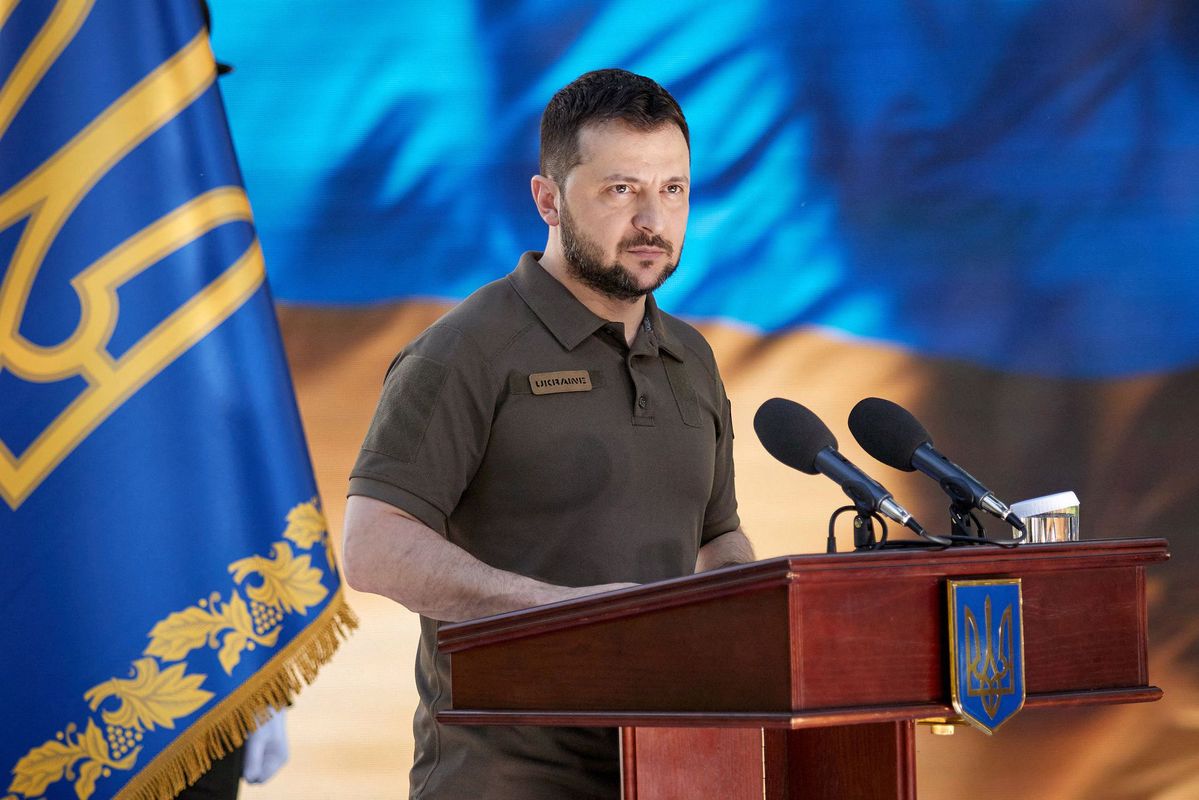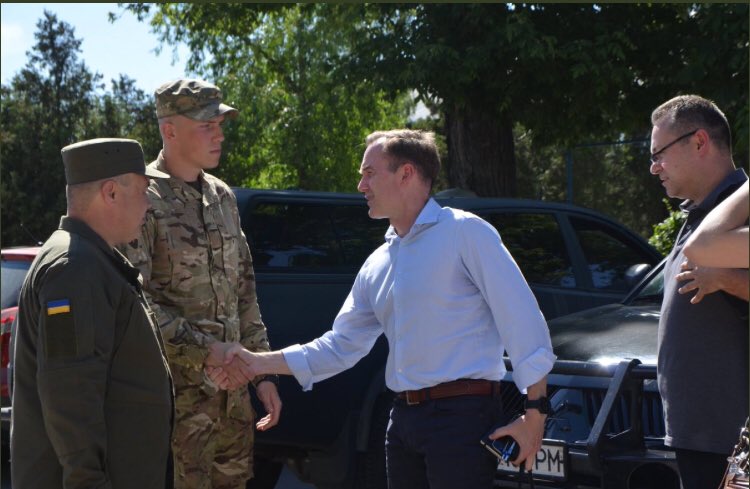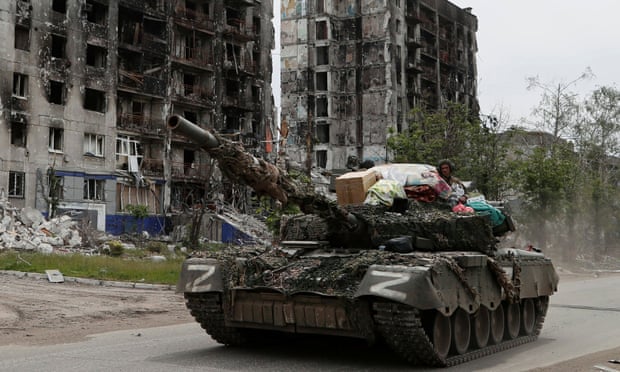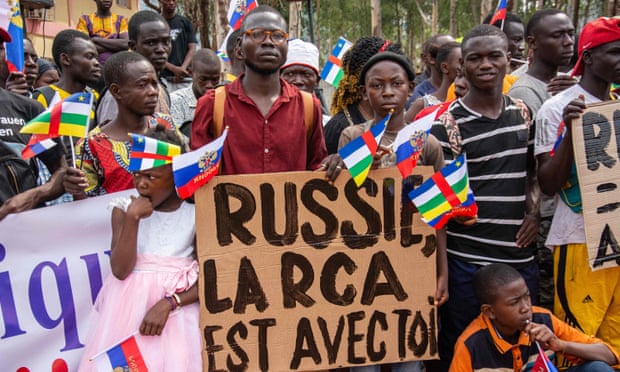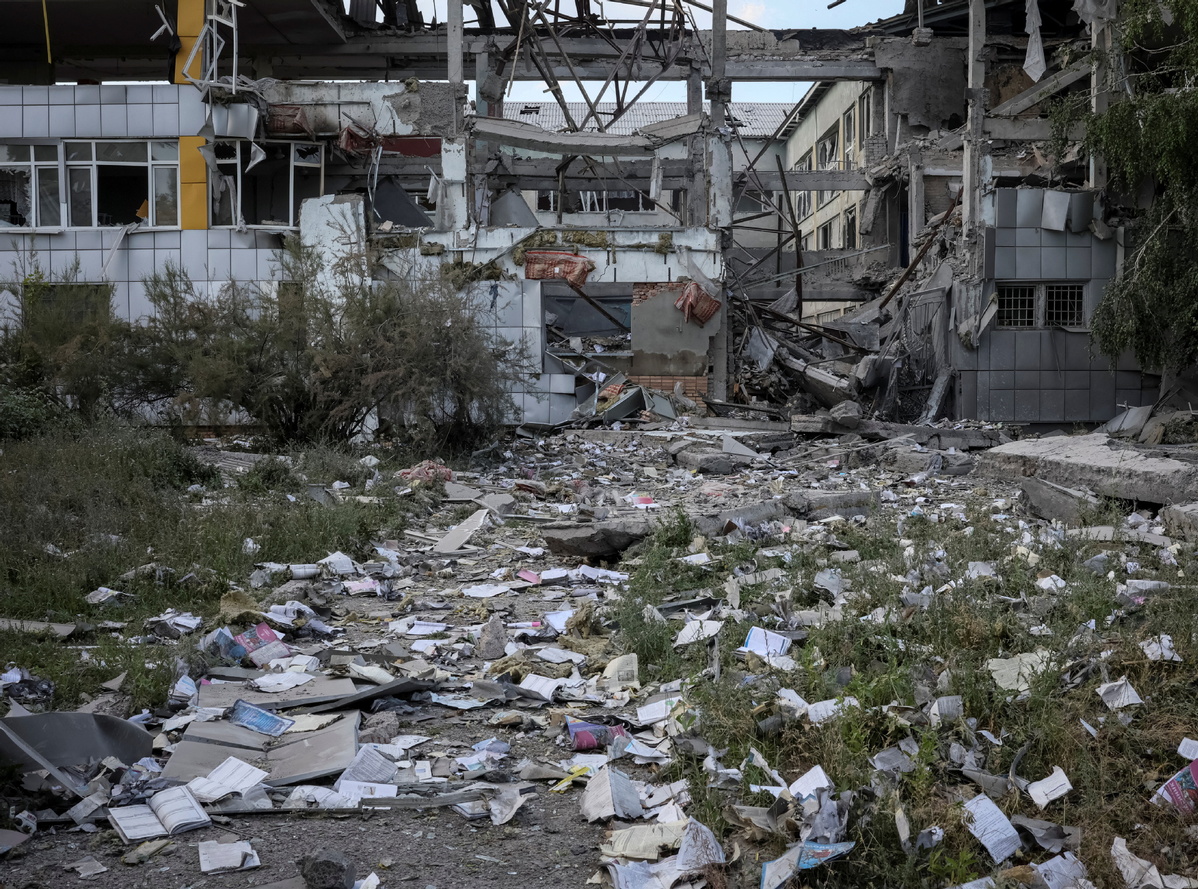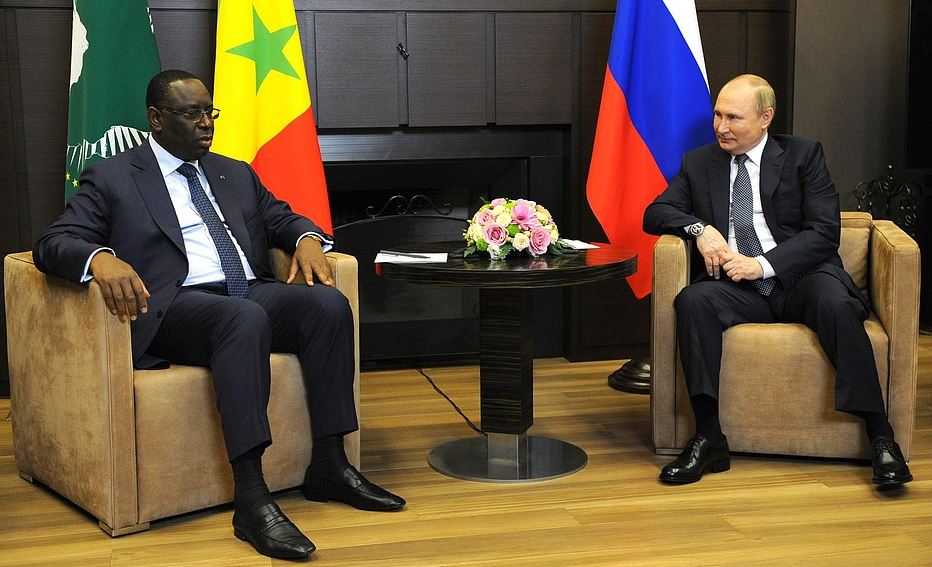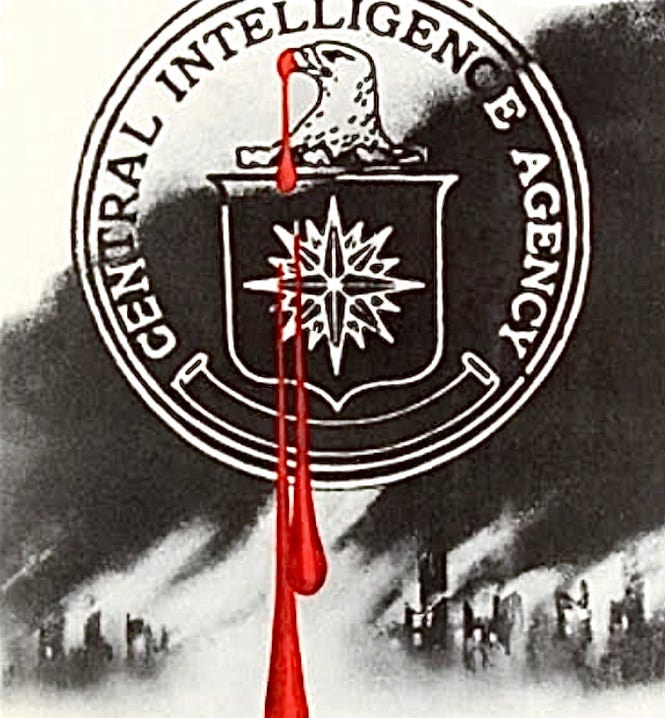Ukraine denounces new attack on civilians in Donetsk

Donetsk Mayor Alexei Kulemzin said the "criminal" Ukrainian attack left at least two women injured by shrapnel. | Photo: EFE
Published June 6, 2022 (5 hours 45 minutes ago)
At 15:50 local time on Sunday, 10 BM-21 Grad projectiles were launched, while another 15 rockets were fired 10 minutes later.
Armed Forces of Ukraine bombarded residential areas of the city of Donetsk, in the eastern Donbas region, with rockets this Sunday, leaving several dead and wounded, official sources reported.
Representatives of the self-proclaimed Donetsk People's Republic said Ukrainian elements first fired a 25-round Grad round at the Petrovsky and Kievsky districts of the city.
They specified that at 3:50 p.m. local time on Sunday, 10 BM-21 Grad projectiles were launched, while another 15 rockets were fired 10 minutes later.
Later, the Ukrainian military fired 10 122mm and 30 152mm caliber rockets at various points in the city.
Donetsk Mayor Alexei Kulemzin said on his side that the "criminal" Ukrainian attack on the square of the train station in the Kievsky district left two women injured by shrapnel, for which they had to be hospitalized.
On Saturday, the Ukrainian military carried out a similar attack on civilian areas that left at least three people dead and some 22 wounded, including two minors.
The Russian Defense Ministry, for its part, reported this Sunday that its aerospace forces destroyed several T-27 tanks and other armored vehicles delivered by Eastern European countries, which were located in the facilities of a car repair company in the outskirts. from Kyiv.
https://www.telesurtv.net/news/ucrania- ... -0002.html
Russia reports destruction of 190 Ukrainian planes during operation

Russia has disabled 129 helicopters, 1,127 drones, 330 anti-aircraft missile systems and 3,424 tanks, among other Ukrainian supplies. | Photo: AA
Published June 6, 2022 (6 minutes ago)
Roman Starovoit, governor of the Russian province of Kursk, bordering Ukraine, denounced an attack from the neighboring country.
Russian Defense Ministry spokesman Igor Konashenkov reported Monday that the Russian army has destroyed a total of 190 Ukrainian planes since the start of the special military operation.
He also reported that throughout the conflict Russia has disabled 129 helicopters, 1,127 unmanned aerial vehicles, 330 anti-aircraft missile systems, 3,424 tanks and other armored combat vehicles, 473 multiple rocket launchers, 1,795 field artillery units and mortars, as well as 3,446 special military vehicles.
On the other hand, in the context of the conflict between kyiv and Moscow, the governor of Kursk province, Román Starovoit, denounced that projectiles were launched at a Russian town from the Ukrainian side of the border.
"The town of Tiótkino, in the Glushkovo district, has been bombed again this morning. They attacked the bridge and local businesses," the official wrote through his account on the Telegram social network.
According to Starovoit, the bridge, the main target of the attacks, was damaged, as was a sugar refinery and a residential building, but fortunately there were no loss of lives or injuries.
Since last February 24, when the military operation began, several Russian border regions have reported damage and casualties from projectiles launched from the part administered by kyiv.
In May, the governor of Kursk revealed that additional artillery and missile systems had arrived in the city in order to reinforce the defense of the province.
https://www.telesurtv.net/news/rusia-de ... -0005.html
Russia accuses the West of preventing negotiations with Ukraine

"If the work of the Russian media on US territory is not normalized, there will be severe countermeasures," Zakharova warned. | Photo: EFE
Published June 5, 2022
The Russian foreign minister denounced that the West prohibited the Ukrainians from continuing with the negotiation process, despite the fact that they had already presented proposals.
Russian Foreign Minister Sergey Lavrov accused the Western bloc on Sunday of preventing the free development of negotiations in Ukraine in favor of diplomatically settling the conflict.
According to the Russian foreign minister, the Ukrainian government had developed some proposals to be discussed with Moscow, but later, by order of the West, these were discarded, "we took those proposals as a basis. But after a day, the West prohibited the Ukrainians from continue with this process," he said.
Alluding to the threat posed by the West's position of continuing the conflict, the spokeswoman for the Russian Foreign Ministry, Maria Zajárova, denounced that Ukrainian neo-Nazi groups continue to intensify the fighting, "the neo-Nazis are actively using these weapons supplied by the United States against the civilian population," he said.
"When a group of countries seizes power, big problems are to be expected. The dictation of one pole is impossible and will lead to devastating consequences," Zakharova stressed.
The spokeswoman for the Russian Foreign Ministry also explained that her country at no time hinders the export of cereals to Ukraine by sea, "we are ready to ensure the export of grain, if Ukraine deactivates naval mines drifting in the Black Sea", he added.
"If the work of the Russian media on US territory is not normalized, there will be severe countermeasures," Zakharova warned.
https://www.telesurtv.net/news/rusia-go ... -0021.html
Google Translator
********************************
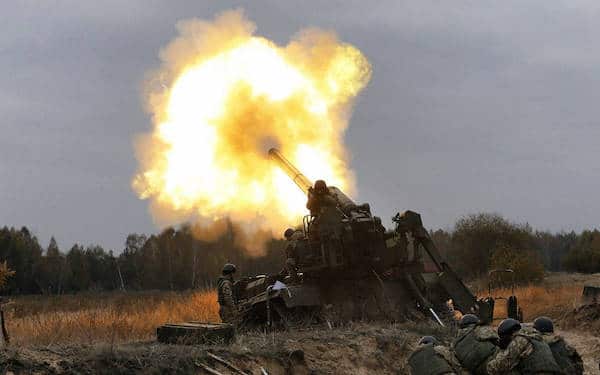 Ukrainian Army terror bombings
Ukrainian Army terror bombings
By Laurent Brayard (Posted Jun 06, 2022)
Originally published: Donbass Insider on May 31, 2022 (more by Donbass Insider) |
r
Since Sunday, 29 May, Ukrainian artillery has opened fire on exclusively civilian residential areas in the city of Donetsk and other cities in Donbass. The Ukrainian army has always engaged in terror bombing, in order to terrorise the population and kill Russians, since the beginning of the Ukrainian aggression in Eastern Ukraine. In Donetsk, the western districts are regularly targeted by artillery and many civilians have died, unfortunately, including children. The centre and east of the city have been hit, but mostly in 2014 and 2015, and less frequently between 2016 and 2017. This situation had not been seen in the city since then, and the intensity and depth of the attacks had not been seen at this level since 2014. The firing started at around 6pm, then started again at around 8.15pm until around 1am, then more shells were fired during the night. The death toll was already 4 and 20 injured, but on Monday morning the shelling resumed, notably with 155 mm heavy artillery, but also with 300 mm Smertch missiles. One of the missiles hit the badly damaged school No. 22 in the centre of the city, killing three more people.
The USA, Canada and Australia are as much at fault as Ukraine. I was present at an impact and saw the nervousness of the Military Police inspectors and experts. The impact was strange, few shrapnel holes, a strong blast and a different texture of the earth in the shell hole. The answer came quickly: the shots were fired by American 155 calibre M777 howitzers, supplied by the USA, Canada and Australia. They have a greater range than the weapons then possessed by Ukraine, which allowed the Ukrainians to open fire from much further away. This gun fires at a distance of more than 40 km, and up to a maximum range of 57 km. Under these conditions, the M777 can remain relatively unobtrusive and out of sight of drones or Russian air force reconnaissance. It is an excellent howitzer, which entered service in 2005, and can be equipped with modern and highly effective sighting systems. A total of 18 guns have been delivered by these three countries, with sighting systems, but the U.S. has announced the delivery of 108 artillery pieces, the next ones without sighting systems in April and May 2022. These weapons, which should have been used to defend Ukraine, were immediately used to kill civilians and these terror bombings, in the greatest American tradition of bombing. Everyone remembers the hallucinatory bombings of Nazi Germany, especially of cities, to raze to the ground but especially to kill the German population. The expected effect, i.e. turning public opinion against the Nazis, was the opposite… This is also the case in the Donbass and in Ukraine.
Civilian casualties, again and again, the Ukrainian army continues its work of death. During the day of 30 May, the Ukrainians fired no less than 150 shells and rockets (122, 152, 155 mm, Grad and Hurricane), not to mention Smertch missiles. A total of 13 localities were hit, with 5 civilians killed and 18 wounded, 19 buildings damaged or destroyed, 9 of which were administrative buildings, schools, etc. (Schools No. 5 and 22). Among those killed, there were four women (three born in 1952, 1956 and 1967). Among the injured, a three-year-old child was injured, three men (born between 1932 and 1969) and 14 women (born between 1944 and 2001). Elsewhere in the Republic, other victims were counted during the days of 29 and 30 May. The total number of buildings destroyed or affected by the Ukrainian bombing is staggering, and has been since 17 February. These included 3,777 homes, 792 buildings and civilian infrastructure, including 50 medical facilities, 137 educational facilities (schools, colleges, etc.), and the destruction of 437 vehicles. The DPR authorities conducted more than 3,500 investigations and recorded during this critical period the death of 130 civilians, including 4 children, and the injury of 608 other inhabitants, including 48 children. It is more than likely that all these shootings are calculated by officers and non-commissioned officers, who are clearly dishonoring themselves as soldiers, by knowingly and consciously targeting civilians. It is true that terror bombing was invented and used by the Anglo-Saxons, namely Nazi Germany, Great Britain and the USA. The latter did not hesitate to send the only atomic bombs ever dropped on two cities that were not military targets, Nagasaki and Hiroshima in Japan. This mentality, including civilians in the targets, also comes from the invention of industrial warfare, which from then on killed many more civilians than soldiers.
Revenge fire, to destroy and kill, on the slope of defeat. It is clear that in the difficulty in which the Ukrainian army finds itself in the Donbass, with very heavy losses, particularly in the North, in the regions of Krasny Liman, Severodonetsk or Lissichansk, not to mention the Russian bridgehead of Popasnaya, but also in the Centre in the region of Gorlovka, Avdeevka or Mariinka, it is now on an increasingly inclined slope, leading to its certain defeat. These bombings show above all the demoralization of this army, and the abject violence in which Ukraine is throwing itself, having only bile and vengeance to offer as war tactics. As I write, a shell has just fallen in the east of Donetsk, not far from my home (30 May, 23:15), which will certainly be followed by others during the night. My neighborhood is quite peaceful, there are, again, no military targets. In Europe, there are already reports of violence by Ukrainian refugees, attacking local residents, being belligerent and angry. More than 8 years of war propaganda, not to mention Nazi ideology, will have led this people to absurd drifts, leading to dead ends. The shooting of civilians was undoubtedly decided at the highest level by the commander-in-chief and with the approval of President Zelensky. It is more than likely that the use of these weapons to kill civilians was also endorsed by the supplier, namely the financier of the Maidan, the United States. These killings will also be used by Western and Ukrainian propaganda to invent “Russian bombings”, on their own cities and civilians, or ethnic Russians in Ukraine. Finally, for the Ukrainian soldier, it will only be a matter of revenge and before succumbing, to take as many people as possible with them. In Nazi Germany, during the twilight of the Gods, thousands of Germans were sacrificed in this way, in a war lost in advance and in pure losses.
A French journalist sent to his death without any military equipment or valid protection. Meanwhile, in Russian prisons, the captured Ukrainian soldiers all tell the same story: they didn’t know, they were forced, they were drivers, cooks, nurses, in the quartermaster’s office or the regiment’s administrative services. Even agents of the SBU political police have been seen making such statements and many videos show soldiers with tears in their eyes, asking to go home, and swearing that they had always been close to their Russian blood brothers. In the West and in the Ukrainian propaganda offices, brilliant victories are piled up, in which thousands of Russians have perished, with hundreds of tanks in flames and the air force destroyed. Elsewhere, there is talk of empty stocks, no more ammunition, no more missiles, no more tanks in reserve. These crazy stories are shown on the French 8 o’clock news, and even “war reporters” like BFMTV are sent in to be killed, without any essential military equipment. Frédéric Leclerc-Imhoff died today, on the Ukrainian side, wearing a bullet-proof jacket, which politicians usually wear under their suits. His lower abdomen was not protected, nor was his neck, he was not wearing a helmet on his head (he died from it), and there was no PRESS inscription on his torso or back. This 32 year old man, criminally sent by his editors to his death, without any equipment and without military footwear (he was wearing hiking boots), was sent to the scrap heap by irresponsible people. It seems that he had not even one experience of the genre, and of war zones. Why did he die? Like those in the Donbass, for the American Maïdan, for the imperialist delusions of a country that sows death and destruction everywhere it goes. If France had had General De Gaulle at its head, he would never have accepted that France fall under the control of an “ally”, who is slowly and surely dragging the former down. At Donbass Insider we express our sorrow and pain to his family, which we share with them. He joins the very long cohort of tens of thousands of victims of this nightmarish revolution…. Called in Ukraine by the small name of “Revolution of Dignity”.
https://mronline.org/2022/06/06/ukraini ... -bombings/
**************************************
The US Empire Will Be Defeated By The US Empire: Notes From The Edge Of The Narrative Matrix

❖
Empire managers: Putin invaded Ukraine!
Public: Oh no! What should we do about it?
Empire managers: Greatly increase military spending, work to weaken Russia, and censor dissenting opinions.
Public: Wait, aren’t those things you’ve always wanted to do anyway?
Empire managers: Hush.
❖
Russian propaganda poses a much smaller threat to the western world than the various government agendas that are being rolled out under the justification of fighting Russian propaganda.
❖
Fuel prices are soaring in part because of an economic war the US empire willfully initiated in response to a proxy war the US empire deliberately provoked and westerners are being trained to look at their shrinking bank accounts and yell “Damn you, Putin!”
Only by massive amounts of propaganda would people consent to unprecedented acts of economic warfare which directly hurt them and benefit them in no way shape or form.
❖
As the world slides closer to nuclear war it would be cool if Americans could take a break from a debate about gun laws that will with absolute certainty lead nowhere and seriously discuss whether they want their government waging a rapidly escalating proxy war against Russia.
❖
The spectrum of acceptable debate on US foreign policy ranges from (A) war hawks who insist the US has never done anything wrong to (B) “progressives” who say the US is basically a good faith actor who just makes well-intentioned oopsie poopsie mistakes but should still definitely keep arming Ukraine. Position (B) is the furthest you’re allowed to go away from “the US never does anything wrong” in mainstream discourse. It includes Bernie Sanders’ foreign policy advisor, who smears and dismisses leftists who say the US is acting in a malignant way in Ukraine.
No voice at all is ever given to the (in my opinion correct) position that the US is a tyrannical regime whose immense body count is explained not by accidents but by the desire to dominate the world at any cost. The elimination of this position from the debate is by design.
❖
Sure noble wars can be fought in theory and have been fought in practice. It’s just that you’ve got swamp water for brains if you believe that’s what the US is doing.
❖
Never attribute to conspiracy what can be adequately explained by the inevitable corruption and tyranny of status quo capitalism.
❖
Whatever ends up collapsing the US empire is far less likely to come from Russia or China than from the US empire itself.
❖
A big part of the western nervousness about China revolves around the fact that we’re about to be surpassed by an ancient civilization of non-white people who are indigenous to their land and have never been truly conquered and colonized by Europeans.
❖
If you don’t respect the way China has been able to pull so many of its people out of extreme poverty, and don’t get why such actions would cause such unified support for their government, it’s simply because you lack an adequate understanding of the anguish of extreme poverty.
❖
I’ve met some cute kids in my time but nobody’s as adorable as westerners who talk about Chinese people being propagandized.
❖
The Chinese government exerts a lot of power over its population, but it also takes responsibility for the way it uses that power. The USA’s rulers exert a comparable amount of power over its population, but they never take any responsibility for what they do with it.
❖
Can’t believe Mohammed bin Salman is sullying Saudi Arabia’s name by meeting with the president of the United States.
❖
Putin should try staging a few mass beheadings and dismembering a Washington Post reporter with a bone saw to get on America’s good side.
❖
Many empire apologists aren’t actually defending the empire, they’re just defending against the suggestion that everything they believe about their nation, their media, their government and their world, is a lie.
❖
The most impressive feat of engineering this century has been of the ‘social’ variety: funneling mainstream political attention into agendas which don’t inconvenience the powerful in the information age where the ravages of capitalism and imperialism are right there to be seen in plain sight.
The social engineering necessary to keep politically inclined people fixated on agendas that either won’t lead anywhere or which trouble the powerful in no way, even as we entered an unprecedented age of information access, is one of the most awe-inspiring human achievements in history.
https://caitlinjohnstone.com/2022/06/04 ... ve-matrix/
************************
(There are a few inaccuracies here, but none fatal.)
War Crimes, From Nuremburg To Ukraine
by Ellen Taylor | Spring 2022 Edition, Uncategorized
Iwas in Nuremberg during the war crimes trials which followed WWII. My father, Brig. Gen. Telford Taylor, was Chief Prosecutor during the second, American phase. The French, Russian and British staffs had gone home to continue trials at home, but the US stayed longer, and scheduled about 400 additional defendants. They were divided into twelve categories: judges, doctors, industrialists, etc. There were 142 convictions and ten death sentences.
I remember the high spirits of the occupying troops and tribunal staff,
The joy of triumph and victory. I danced with them in the ballroom of the Grand Hotel, where the officials and court lawyers spent their evenings. I scared myself by looking into seemingly-bottomless bomb craters, played in the war-shattered wreckage of our commandeered townhouse, and listened to stories told by the servants, who were tearfully glad to be fed and sheltered during the hunger-stricken post-war years.
And, without paying much attention or expressing any precocious interest, I grew up convinced of the axiomatic importance, however difficult it might be to maintain universal accountability, of international law for human survival.
Although war crimes continued to flourish, the Nuremberg tribunal slowly drifted into the dustbin, often disparaged as victor’s justice. My dad, in his book about the My Lai massacre in Vietnam, was pessimistic about the enforceability of its precepts. The International Criminal Court, established in 2002, seemed to concentrate mostly in Africa, and the ghost of colonialism was in attendance at all the special tribunals. Books were written accusing the US of war crimes in Iraq, which created a mere ripple in the public consciousness.
However, as a result of Russia’s invasion of Ukraine, this year, journalists have taken up the subject of war crimes with enthusiasm. Even my local paper published an editorial demanding that a war crimes tribunal be organized to hang Putin, as the Nuremberg war criminals were hanged. Karim Khan, chief prosecutor for the International Criminal Court (ICC), is on site conducting investigations. Vladimir Putin is accused of waging aggressive war.
At the Nuremberg tribunals, four charges were brought against defendants: premeditated conspiracy to commit the crimes against the peace, the crime of initiating aggressive war, war crimes, and crimes against humanity. The judges asserted that waging aggressive war was the gravest crime of all: it was “essentially an evil thing” and “not only an international crime; it is the supreme international crime, differing only from other war crimes in that it contains within itself the accumulated evil of the whole”.
To my knowledge, since then, no one has been charged with the first two charges: conspiracy to instigate a war, and the initiation of a war of aggression. However, many influential voices are now accusing Russian President Putin of committing these crimes.
Russia invaded Ukraine on Feb 26th 2022. By describing this assault as a “special operation” instead of an act of war, Russian President Putin avoided legal interface with a document for which he confesses great respect, the United Nations Charter. This document, like the Nuremberg Charter, has been frequently dismissed by state actors as obsolete, and is nonchalantly violated by many nations including the US. Although he distinguished the invasion as a special operation, Putin has referred to the document in the context of Russia’s actions:
Chapter 2 article 4 states that “All Members…shall refrain from the threat or use of force” against another nation. Chapter 7 Article 51, however, states that “nothing… shall impair the inherent right of… self-defense if an armed attack occurs against a Member”.
The OSCE (Organization for Security and Cooperation in Europe), an intergovernmental organization with Observer status in the United Nations, addresses the issue of the limits of security: ”States will not strengthen their security at the expense of other states…every state has an equal right to security, with comparable levels of security for all”.
The OSCE Charter was designed expressly to contribute to the formation of a common and indivisible security space in the OSCE area, free of dividing lines.
President G.H.W.Bush [said,] “We have no intention, even in our thoughts, of harming the Soviet Union in any way”. He believed that a bright new world was at hand.
Russian efforts to achieve peace in Europe and security for the Russian people were exemplary and extensive since the fall of the Berlin Wall, and the subsequent dissolution of the Union of Soviet Socialist Republics. President Michael Gorbachev had been euphoric when the Berlin Wall went down in 1991. He himself had barely escaped WWII : only three out of a hundred boys, just a little older than he, survived. He nevertheless suffered heavy personal losses, from the war, and under Stalin.
Now, as the wall fell, his anxiety evaporated, and in his elation he dared to speak of “Our Common European Home- from the Atlantic to the Urals”. He had formed friendships with most of Europe’s leaders. He believed that his acceptance of German reunification would lead to an age of peace, and that the heretofore hostile military organization, NATO, would cease its aggression.
He had been assured of this, over and over, by White House Chief of Staff James Baker (NATO will move “not one inch eastward”), German Vice-Chancellor Hans-Dietrich Genscher (“ the changes in Eastern Europe and the German unification process must not lead to an impairment of Soviet security interests”), Helmut Kohl, German Chancellor( “We believe that NATO should not expand the sphere of its activity”), Baker again (“Before saying a few words about the German issue, I wanted to emphasize that our policies are not aimed at separating Eastern Europe from the Soviet Union. We had that policy before. But today we are interested in building a stable Europe, and doing it together with you”),French leader Francois Mitterrand (“The West must…. create security conditions for you, as well as European security as a whole”), Margaret Thatcher ( “We must find ways to give the Soviet Union confidence that its security would be assured…. CSCE could be an umbrella for all this, as well as being the forum which brought the Soviet Union fully into discussion about the future of Europe.”), G. H.W.Bush ( “So what we tried to do was to take account of your concerns expressed to me and others, and we did it in the following ways: by our joint declaration on non-aggression; in our invitation to you to come to NATO; in our agreement to open NATO to regular diplomatic contact with your government and those of the Eastern European countries; and our offer on assurances on the future”), NATO Secretary General Manfred Woerner (“We must not permit the isolation of the USSR from the European community…the fact that we will not place a NATO army outside of German territory gives the Soviet Union a firm guarantee”), and President G.H.W.Bush ( “We have no intention, even in our thoughts, of harming the Soviet Union in any way”). He believed that that a bright new world was at hand.
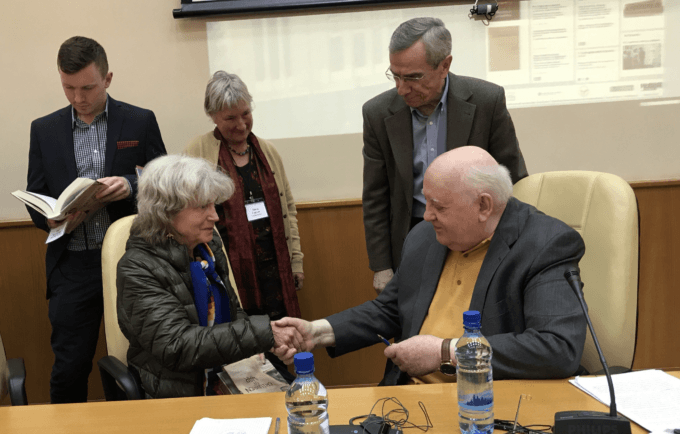
The author and Mikhail Gorbachev in 2016, during an expedition with the Center for Citizen Initiatives. Photo courtesy of Ellen Taylor.
“I think it is a tragic mistake. There is no reason for this whatsoever. No one was threatening anybody else. I was particularly bothered the references to Russia as a country dying to attack Western Europe.”
Because of the terrors of its history in the last centuries, Russia was unwilling to give up this dream expressed by Gorbachev. Therefore, its expressions of indignation were muted when the United States began almost instantly to meddle in Russian affairs, transmitting information acquired through the NSA to help Boris Yeltsin’s rise to power. When the Soviet Union collapsed, Russian assets were sold off, many to foreign conglomerates, and the economy was pillaged.
Russian protest, also, was mild, when, in 1999, the West definitively broke its word, and a procession of countries, whose borders extended 800 miles to the east of the 1991 lines, began to make their entrances into NATO. By 2007, fourteen countries had been added to NATO since the Wall had fallen.
George Kennan was a well-known historian and diplomat, and ambassador to Russia through the Stalinist period. He greeted this next step, the expansion of NATO to include the previous Warsaw Pact countries, with disbelief and disgust:
“I think it is a tragic mistake. There is no reason for this whatsoever. No one was threatening anybody else. I was particularly bothered the references to Russia as a country dying to attack Western Europe. What bothers me is how superficial and ill-informed the whole Senate debate was. Russia’s democracy is as far advanced, if not farther, than any of these countries we’ve just signed up to defend from Russia.
But something of the highest importance is at stake here. Perhaps it is not too late to advance the view that, I believe, is not only mine alone but is shared by a number of others with extensive and in most instances more recent experience in Russian matters. The view, bluntly stated, is that expanding NATO would be the most fateful error of American foreign policy in the entire post-Cold-War era.”
Vladimir Putin, who came to power in 2000, exhibited the same reluctance to give up the Dream, expressed by Gorbachev, of a “Common European Home”. In 2000, he asked then-US- President Clinton if Russia could join NATO. This was not a novel idea: Krushchev had made the same request in 1954, and Boris Yeltsin in 1991. Both requests were dismissed.
As for Clinton, he bluntly retorted that if Russia were part of NATO there would be no reason for it to exist.
Putin’s life, like Gorbachev’s, had been devastated by WWII: his brother killed, his family destroyed by the terrible siege of Leningrad.
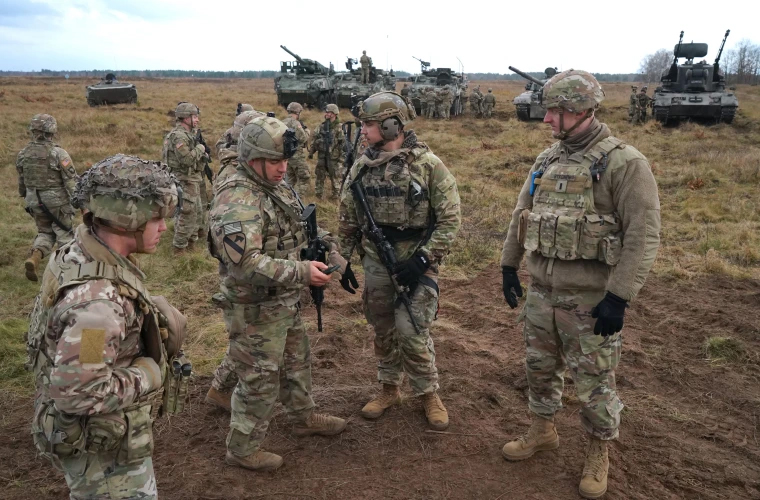
Soldiers from Poland, Britain, US and Romania take part in a joint military exercise in Poland.
The spectacle of military installations bristling with missiles in an ominously strengthening cordon surrounding Russia, and the tramp of thousands of boots, as NATO conducted military exercises on its borders (estimated at about four simulated battles a month, with Russia in the role of enemy force) finally woke up Russia’s historical memory of invasion. At the Munich Conference, in 2007, addressing the 43rd Munich Conference of Security Policy, an alarmed President Putin delivered a powerful and now famous speech, addressing the noose he perceived, tightening around Russia.
He began by quoting FDR, “security for one is security for all” and denouncing the unipolar world which had resulted from the Soviet Union’s collapse: a world with only one master, which is destructive of that security “pernicious not only for all those within this system, but also for the sovereign itself because it destroys itself from within.”
Observing that unipolarity does not bring peace and alluding to the wars in the Middle East, he noted that “more people are dying than ever before” due to the “uncontained use of hyper-force in international relations”.
“No one feels safe!” he repeated. “No one can feel like international law is like a stone wall which will protect them!” and, after addressing the ring of NATO bases and missiles surrounding Russia, he asked, pointedly,
“I think it is obvious that NATO expansion does not have any relation with the modernization of the Alliance itself or with ensuring security in Europe. On the contrary, it represents a serious provocation that reduces the level of mutual trust. And we have the right to ask: against whom is this expansion intended?”
The audience of diplomats and statesmen and women exchanged glances and were silent.
Then he presented a visual picture of a new architecture of global security which called to mind Gorbachev’s “Common European Home”. He detailed the need for bringing about a fairer system of global economic relations to replace the current one in which donor countries “deliver charity with one hand and collect profits with the other.”
He lamented the stagnation of disarmament efforts and the billions spent on nuclear weapons. He decried the US withdrawal from the ABM treaty, and announced he had brought a proposal to the conference, to end the threatened US militarization of space. He embraced the UN Charter as a cornerstone for the new security architecture and a foundation with which to replace the unipolar system with multipolarity.
Putin did not mince words in his speech. He was earnest and unambiguous. But, two months later, with a proverbial poke in the Russian Bear’s eye, in Bucharest, at the NATO ministerial summit, NATO welcomed Ukraine’s and Georgia’s Euro-Atlantic aspirations for membership in NATO.
Since then, Russia has made every possible effort to express its alarm at the spectacle of NATO’s armed might on its borders.
It has watched, as NATO’s military exercises have increased: battalions from the different countries are deployed on Russia’s borders and engage “the enemy” in various scenarios, including nuclear, an estimated forty time a year. One such script envisioned atrocities being committed against Estonia, a NATO country, by conventional invading Russian forces. Enacted responses practiced the use of low-yield nuclear missiles deployed from US submarines.
There are military bases well-supplied with weapons in every NATO country on Russia’s borders, including trillion-dollar missile shields in Romania and Poland. The ABMs can be converted to offensive weapons by merely inserting a disc.
“Europe 2020” was designed to be the largest military exercise in 25 years. It deployed 125,000 troops from NATO countries. US troops brought 20,000 pieces of equipment from home, and rushed toward previously established storage positions around Europe to deploy more weapons as swiftly as possible and meet 9000 troops already in Europe on Russia’s border. As a sort of psyops feature, the exercise was to have consummated on the 80th anniversary of Operation Barbarossa, the Nazi invasion of Russia in 1941, a deeply traumatic and resonating catastrophe in Russian history. The exercise had to be aborted because of COVID.
In the face of this menace, Russia’s General Gerasimov stated he was convinced that NATO was preparing for war. And indeed there is no way these exercises can be described as nonthreatening. But the US views them differently. In the words of former Army Secretary Ryan McCarthy, “The last 18 years of conflict built muscle memory in counterinsurgency, but with this came atrophy in other areas. We are now engaging these other muscle groups.”
US diplomats , clearly not expecting to be believed, claimed that missiles positioned on Russia’s borders were intended for Iran. Jack Matlock, former ambassador to Russia, practically laughing as he spoke, told Putin that NATO’s line of fortresses was merely a jobs plan, intended to decrease the US unemployment rates.
General Tod Wolters, Commander of US forces in Europe and Supreme Allied Commander Europe, favors a “flexible first-use policy” regarding nuclear weapons.
As General Mark Milley , chairman of the Joint Chiefs of Staff, observed, “the character of war is changing frequency”. Our nation is bent on an aggressive upgrade of existing weapons systems, and purchase of new technology: hypersonic weapons capable of 15,000mph speeds, artificial intelligence surpassing the imagination of science fiction, autonomous systems and platforms, 5G, “low-yield” nuclear weapons, dramatic advances in cyberspace with microelectronics swifter by many orders of magnitude. For outer space we have developed what former President Trump described at their unveiling as “some of the most incredible weapons the world has ever seen”.
The new National Defense Strategy embodies the same spirit as its predecessors going back to the Plan for the New American Century of 1996. It requires full-spectrum dominance. It prepares for a high-end, “near-peer” war. Its goals are” integrated deterrence, campaigning and actions that build enduring advantages”. “Integrated deterrence” here means, engaging the contributions of all branches of the military, the above-described forward motion of weapons and bases toward enemies, exercises, and adventures such as the provocative entrance of guided missile-carrying destroyers with aerial escort, sailing (as they did) into the Barents Sea, to “enforce freedom of navigation”.
“Campaigning” includes infiltration, use of special forces, the media, disinformation dissemination, cyber sabotage, sanctions, and other tactics to achieve the objectives of full spectrum dominance. “Build enduring advantages” means unwavering attention to and purchase of the latest weapons technologies.
The word “Competitor” is used in the document interchangeably with “enemy”.
Over the years, in preparation for furthering this dominance, in spite of entreaties from the UN, allies, and Russia and China themselves, the US has withdrawn from multiple treaties: ABM(2002),Iran Nuclear Deal (2018), UN Human Rights Council(2018), INF (2019), the Nuclear Nonproliferation treaty (2020), and the Open Skies Treaty (2020).
Neither Russia or China is eager for the role of US adversary, the “near-peer” enemy which will help the US to “reactivate atrophied muscle groups”. They have had to be teased, baited and tortured, like reluctant bulls in a bullfight, into responding. The Ukraine catastrophe is part of the result.
Russians are deeply attached to the Ukraine, which was part of Russia for far longer than the US has existed: indeed, for most of Ukraine, from the 9th century until 1991. This love has been dismissed as mystical nonsense by editorials in the New York Times and other opinion-forming media. Naomi Klein has described it as “toxic nostalgia.”
Nostalgia occupies an enormous realm in human nature. It is the deep and ever-stirring nursery for human creativity. It sometimes motivates self-defense, as in the American indigenous peoples’ resistance to assimilation, or the Russian kulaks’ resistance to Stalin-imposed collectivization. It is toxic when it drives military or cultural aggression.
However, nostalgia notwithstanding, Russia did not resist Ukraine’s bid for independence in 1991, nor did it interfere with the illegal coup of 2014, only taking the critically self-protective step of reclaiming its naval base in Sebastopol and liberating Krushchev’s gift to Ukraine, Russian Crimea.
To be sure, there is nostalgia, just as the people of my bioregion dream of the mighty salmon runs and giant trees of their childhood. Ukraine and Russia have what might be called a chthonic relationship, one relating to the earth, the rivers, the spirit. Students of Russian history, culture and literature, begin their educational journey with immersion in the life and events of Rus, what is now Ukraine. The Russian Orthodox Church had its origins in Ukraine.
The action of Russia’s great epic poem, “The Song of Igor’s Campaign,” occurs in present-day Ukraine. It is, is, in beauty and profundity, comparable to the Shanameh of Persia, the Kalevala of Scandinavia, the Mesopotamian Gilgamesh, or the French Song of Roland. It is beloved in Russia and memorized by Russian schoolchildren. Many of Russia’s and the world’s favorite authors are Ukrainian: Nikolai Gogol, Mikhail Sholokov, Mikhail Bulgakov, Isaac Babel, Taras Shevchenko. Aleksander Solzenitsyn’s mother was Ukrainian.
The Cossack culture which persisted for centuries in eastern Ukraine between the Don and the Dnieper, is a romantic, and music -and -legend-filled part of Russian cultural heritage. Though much older and deeper, it has a role in art and history not unlike US western movies and literature.
Ukrainians are extensively intermarried with Russians, statesmen among them. Leonid Brezhnev was Ukrainian, Nikita Krushchev had a Ukrainian wife and was raised in the Ukraine, where he was Governor for many years. Dmitri Medvedev’s wife is Ukrainian.
Although there were separatist revolts after WWII in Ukraine, mainly instigated by eastern Ukrainians who had fought with the Nazis, the fact that Krushchev gave Crimea, home of the Russian Navy for almost 250 years, to Ukraine, in 1954, is evidence that he had not the slightest doubt of its intimate relationship with Russia.
Ukraine was the trusted repository for a large quantity (one-third!) of the Soviet Union’s nuclear arsenal, and an important nuclear research facility was located in Kharkov. However, it did not have command and control powers over these weapons and the preplanned launch codes remained in Russia. Therefore, after 1991 they were returned to Russia in the name of nonproliferation.
Thus, the destruction of this arsenal was in reality a destruction of Russian weapons. The Ukraine received assurances. It was inconceivable at the time that one day Ukraine would request their replacement with US weapons, to be pointed at Russia.
In the last decade Ukraine has been the flashpoint of NATO aggression. In 2014 the United States engineered “the most blatant coup in history” as George Friedman, CEO of Stratfor, the “shadow CIA”, described it. The US subsidized it with 5 billion dollars, and engineered it through, among others, Assistant Secretary of State Victoria Nuland, whose clearly recorded conversation with the US Ambassador to Ukraine, was hacked and revealed to the world. The coup was led by the Svoboda (Nazi) Party, and also recorded on tape and video as it violently overthrew democratically-elected Ukrainian President Victor Yanukovich and his government.
Since then, Ukraine has been swiftly developed into a theatre for potential military operations. NATO has conducted exercises. Scripts such as Rapid Trident, involving thousands of Ukrainians and foreigners, have been carried out at Yavoriv, a military base in Ukraine, in the Black Sea, and elsewhere. The Ukrainian military has become skilled, versatile, flexible and, with the help of NATO countries, especially the US, extremely well- armed. Academi, a private military company formerly infamous as Blackwater, has been training Ukrainian soldiers since 2015, especially in city warfare. Ukraine has developed a first-class military.
Over the past two decades Russian diplomats have exhaustively conveyed their objections to the ever-nearing shadow of NATO in Ukraine, but, after Maidan, Russian troops started to appear in greater numbers on Ukraine’s eastern border.
As President Putin observed, “For the US, Ukraine is a matter of geopolitical dividends. For Russia, it is a matter of life or death”.
Vladimir Zelensky campaigned for President of Ukraine in 2019 on a platform of peace, promising to end the fighting in eastern Ukraine where 14,000 eastern Ukrainians had died in the previous five years resisting the coup-imposed Ukrainian regime. He promised to implement the Minsk accords which entailed withdrawal of troops, meaningful dialogue, amnesty for participants in the fighting, release of prisoners, foreign aid withdrawal, special status for autonomy for Luhansk and Donetsk, Ukrainian control of the borders, and monitoring by the OSCE, the European Security and Cooperation organization.
He did not fulfill these campaign promises. Instead, he repeated Ukraine’s intentions to take back the Crimea and suppress the eastern oblasts, in March 2021. Russia’s consternation was expressed in the immediate deployment of tens of thousands of troops to the Ukrainian border.
For the next nine months Russia attempted to negotiate, without success. And, while NATO and US weapons and expertise continued to flow into Ukraine, the Russian standing army grew bigger and bigger on Ukraine’s eastern frontier. Putin reported, “Russia has been forced to respond at every step. The situation keeps worsening and deteriorating. And we are here today, in a situation when we’re forced to resolve it somehow”.
Accompanying Russia’s final negotiations proposal, in December 2021, Putin emphasized that he had “a knife at his throat” and “nowhere further to retreat to”.
His proposal again fell on deaf ears.
By now, Russia had amassed an army of over 100,000 troops on its western border with Ukraine. Opposite them Ukraine had itself amassed an army, the advance guard of which had for the previous decade managed to kill an estimated 14,000 eastern Ukrainians resisting the Maidan coup. As a further threat, NATO had sent additional troops and massive armaments to its member-countries along the Russian border.
Russia repeatedly and steadfastly denied US accusations that it was preparing to invade Ukraine. Ukrainian President Zelensky himself appeared not to believe it.
NATO’s intention was to precipitate an attack. From the legal perspective it was imperative not to be identified as the aggressor. Russia was aware of this too. The looming presence of the Russian army on the border was intended be a negotiations tactic, a forceful demonstration of Russia’s demand for security. Russian leadership owed this to its people: the responsibility to protect.
Rather than preparation for attack, the apparition of 100,00 Russian troops was more like a hunger strike. In the case of both, failure is death, and therein lies its strength, but also its weakness. The hunger striker depends on his captor’s interest in his survival, and it only works if he cares.
By February, U.S. President Biden was fairly dancing with his news that Russia was on the verge of an attack. On Feb. 15th, the OSCE reported that there had been 41 shellings of the Donbas by the Ukranian army. This increased to 756 the next day, then 316, 654, 1,413, 2,026, 2,026, 1,484, on the successive days. Russia, convinced that an attack was imminent, despairing of negotiations, persuaded by information contained in a hacked email, and aware of the danger of waiting any longer, launched its “special operation”.
The rest is history as they say. Be it remembered that Russia’s original casus belli was that Ukraine swear not to become Russia’s official enemy by joining NATO. That was all.
For this, President Zelensky sacrificed his country. In unbelievable images, he armed grandmothers and children( there are pictures of old women being instructed in the use of automatic weapons!) to embellish the image of a tiny valiant country facing a monster. Soon the country was awash with weapons, millions were fleeing, and people from other countries were making their way to Ukraine looking for “profiles in courage” fighting opportunities.
US congressional backing was practically unanimous. The AUMF had been updated without a murmur. President Biden made inflammatory comments such as “ This criminal must not remain in power!” Finland and Sweden asked for NATO membership.
Noam Chomsky, in a May 12th interview by Alternative Radio, condemned Putin’s invasion : “Had Putin been a statesman, would have done something quite different… he would have grasped tentative proposals” made by French President Macron, who since before the invasion had been urging negotiation, and, with them, tried to engage the rest of NATO nations to consider diplomacy to provide a resolution to the violence in Ukraine.
Placed in a historical context, Chomsky’s condemnation is disingenuous. Macron’s idea for negotiations was quickly suppressed by other NATO members. As above illustrated, President Putin and Foreign Minister Lavrov had used every possible avenue and every opportunity to negotiate their urgent issues.
And the US and NATO have been on the warpath for decades and were clearly not going to be deterred this time. Biden had stated that he will allow no breaches of US supremacy: “it is not going to happen on my watch”.
China of course is the main enemy: in the words of Anthony Blinken “the most serious challenge to the long-term US-led world order.” But Russia is a more proximate target. The Administration is fixated on re-election, and war is a time-honored way to gain popularity. Ukraine has many heart-rending human-interest facets. The facades of ancient ruined buildings, rustic villages with vagrant animals, children with soldiers, are a feast for the media and the armaments industry.
Nancy Pelosi reassures President Zelensky that the US will support Ukraine waging war “until victory”. Other Congress members speak of persistence “until the last drop of Ukrainian blood”. More and more billions have happily been supplied, by the US population, to destroy Ukraine. Lloyd Austin makes public the information that a US objective in this co-management of the Ukraine conflict is to “weaken Russia”, a concern which has little to do with the Ukraine, and nothing to do with saving lives. The flow of more and increasingly powerful weapons create a hydra spectacle confronting the Russians: the more heads are severed, the more grow back.
More destruction, more death.
Our very liberal Representative Huffman urges “we can’t let them win!” in his weekly radio interviews.
As well as being providers of weapons, we are active. US intelligence and weapons guidance were complicit in the murders of 12 Russian generals, and in the sinking of the Moskva, star ship of the Russian Navy.
President Biden wrote on June 1st that “ If Russia does not pay a heavy price for its actions it will send message to other would-be aggressors…”
Of course, Russia has already paid a very heavy price, an especially cruel part of it being that it has destroyed part of itself, its soul, its history. But Biden’s pronouncement is certainly a warning against crossing NATO or the US, and it is similar to statements of purpose and objectives, made by prosecutors at the Nuremberg tribunals.
The ICC is in Ukraine collecting evidence of war crimes. No evidence is needed to charge President Putin of waging a war of aggression. It is worthy of note, however, that the aggression of which the Nuremberg defendants were convicted occurred in the context of vastly different circumstances. They did not have to confront the mightiest military power the world has ever seen. None of their victims were remotely ready.
Ukraine was very ready. It was a set-up, and Putin lost his balance first.
The ICC is no doubt discovering facts about crimes against humanity and crimes violating the laws of war. Much depends here on the integrity of the investigators, as there is evidence that some of the alleged crimes were staged, or mistaken identities (mobile crematoriums, etc.)
The Nuremberg-formulated crime, the crime of conspiracy to commit a war of aggression, however, has to be laid at the feet of NATO and the US. Only eight of the original 22 Nuremberg defendants were convicted of this charge. The judgment found that there was a premeditated conspiracy to commit crimes against peace, whose goals were “the disruption of the European order as it had existed since the Treaty of Versailles”, later narrowed to “a conspiracy to wage aggressive war”.
In the present case, the often-repeated claim that Russia’s aggression was unprovoked, is preposterous. The US assertions of its rights to dominance are substantiated by an ample supply of statements such as
“We seek to network our efforts across domains, theaters, and spectrums of conflict to ensure that the US military, in close cooperation with the rest of the US government and our allies and partners, make the folly and costs of aggression very clear”- Kathleen H. Hicks, Assistant Secretary of Defense.
The oppressive presence of this bustling and officious dominance, deliberately provocative, around the world, and embodied in the menacing line of military bases and missiles along Russia’s border, is a conspiracy, a threat, to commit the crime of aggressive war.
A cost citizens pay for this kind of totalitarian assertiveness is also expressed in the Nuremberg judgment: “It was really the recoil of the Nazi blows at liberty that destroyed the Nazi regime. They struck down freedom of speech and press and other freedoms which pass as ordinary civil rights with us, so thoroughly that not even its highest officers dared to warn the people or the Fuehrer that they were taking the road to destruction. The Nuremberg trial has put the handwriting on the wall for the oppressor as well as for the oppressed to read.”
Indeed. Many active and respected commentators, experts and former members of the military have had their access to media outlets terminated, contracts broken, positions lost, because they have not jumped on the bandwagon of war.
We must listen to all voices. Putin has urgently proposed a remodeled security architecture, rapid diminution of weapons, and multipolarity in decision-making, collectively designed under the auspices of the United Nations, to replace the current unipolar dominance of the planet. The consequences of such a transformation would be monumental and, if engineered wisely, extremely therapeutic. His ideas might well improve our chances of survival as we are forced to face the climate, disease and ecological catastrophes which may lie ahead.
https://peaceandplanetnews.org/war-crim ... o-ukraine/
*************************
Trials of war criminals begin in DPR
June 6, 14:44
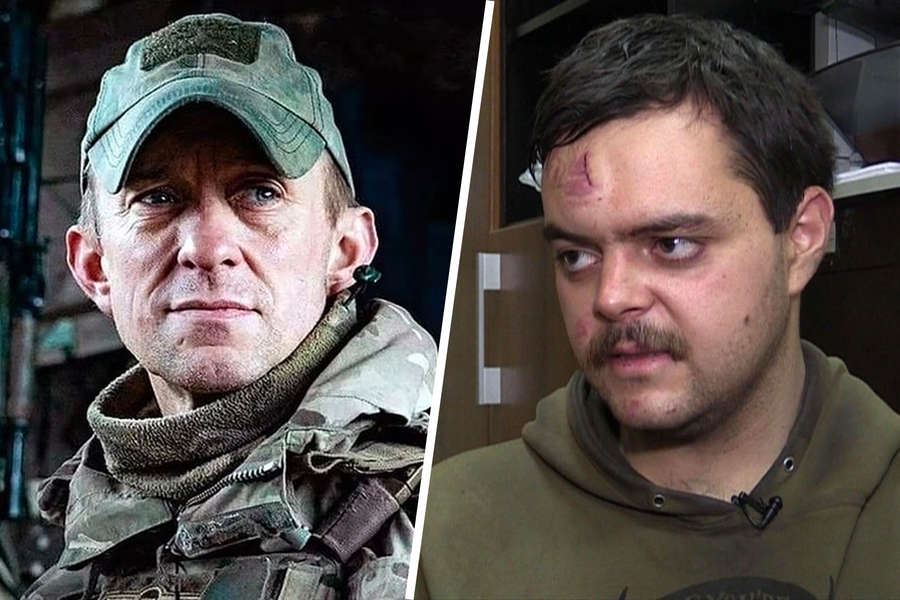
Trials of war criminals begin
in the DPR Today, the first hearing of the trial of foreign mercenaries will take place in the DPR.
The first to go will be two British citizens who were taken prisoner in Mariupol. The trailer will be a mercenary from Morocco.
The investigation of their case took place during May and ended at the end of the month, after which the case materials were submitted to the court.
According to previous statements, during the summer of this year, the DPR plans to hold several stages of the Tribunal over Ukrainian war criminals.
The first stage of the Tribunal is planned to be held in Mariupol and it is already called the Mariupol Tribunal.
Given the severity of the crimes committed, the defendants face the death penalty in the DPR. The DPR has not used the death penalty since 2014.
PS. Both characters from Britain after being captured in their statements tried to pretend to be ordinary soldiers who were "disappointed" and who "did not commit war crimes", but these are already typical excuses from the "army of cooks and drivers".
https://colonelcassad.livejournal.com/7660669.html
Bastard authorities and European imbeciles
colonelcassad
June 6, 15:14

Promising telegram blogger Dmitry M. sold out on his channel.
Bastard authorities and European imbeciles
The European Commission has adopted the sixth package of sanctions to now certainly tear the Russian economy to shreds. But, apparently, the goal is not Russia, but the fire of the world revolution in the economy.
Only some people forgot that the revolution devours its children.
1. Phased oil embargo.
There is no way to immediately abandon our oil. Their own citizens and businesses can put up against the wall. Therefore, we decided to stretch the project for several months in order to find alternative sources of supply. Now Europeans will have to scour the world in search of raw materials of the same quality. In doing so, they will face a shortage of certain types of fuel, such as diesel, which is needed for trucks and agricultural equipment.
And they know that they will still have to find "gray" schemes to get our raw materials, somehow pay for it, bypassing their own idiotic sanctions.
And this is despite the fact that truckers are already on strike in Italy, Poland and Hungary have blocked the entry of foreign cars, the bastard authorities in Warsaw have refused to supply raw materials to Ukraine at all and will now only sell them. It seems that the "club of the people's war", which will properly warm the European officials, has already been swung.
They tried to pack another pig in a bag - a ban on insurance of tankers with Russian oil in order to complicate deliveries to third countries.
Europe is not at all interested in how this measure will affect our partners. This problem can be solved - the issue of supply insurance can be closed at the expense of state guarantees within the framework of interstate agreements with third countries. Russia has always been a responsible and reliable partner, and it will remain so in the future.
2. Sanctions against the National Settlement Depository of Russia.
All for the sake of shouting out loud: "The goal has been achieved, there is a default in Russia."
This is just another lie. We have never refused to pay.
Will you get what? Russia will not be paid, Russia will not return, although we have all the possibilities for this. And a crushing blow will be dealt to the investment sphere. European imbeciles in their zeal have again shown that they consider their own citizens, their business as enemies no less than the Russians.
As a result, no one will receive anything - neither here nor abroad. Investments have turned to dust.
3. Disconnection of Sberbank, Moscow Credit Bank and Rosselkhozbank from SWIFT.
Another attempt to "seriously" prick. Banks continue to operate normally, domestic transactions do not depend on SWIFT and are carried out in the standard mode.
Talented Europeans can continue in the same vein: introduce new, as they like to say now, 100,500th package of sanctions. Judging by how the restrictions work and where the economic situation in the EU is heading against the backdrop of ridiculous anti-Russian horror stories, something has gone wrong.
In general, there will be no Europe from Lisbon to Vladivostok.
It's so entertaining to watch how they continue to smash pots with the West after 30 years of marching along the high road of civilization to the "golden billion".
A rather absurd, but natural, death of Russian Westernism, which initially led to a historical dead end, from which Russia began to emerge after February 24th.
https://colonelcassad.livejournal.com/7660879.html
Google Translator

